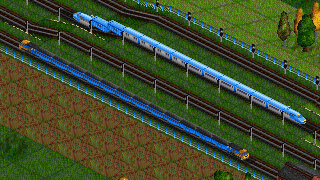Difference between revisions of "NML:Livery override"
From GRFSpecs
Jump to navigationJump to search (content of nml r1625) |
m (NML prefix for images) |
||
| Line 1: | Line 1: | ||
| − | [[Image:liveryoverride.png|frame|right|Same cars, different engine, different car sprites]] |
+ | [[Image:NML liveryoverride.png|frame|right|Same cars, different engine, different car sprites]] |
A livery override block offers the option to change the look and behaviour of a wagon depending on the engine it is attached to. It is basically the same as a graphics-block, except that it only applies to a particular combination of an engine and a wagon. E.g. passenger wagons could adapt their livery to match the engine, to make the consist look like a multiple-unit train. The spritegroup needs to be defined before it can be used in a livery override. A livery override block is always part of the engine definition and looks like |
A livery override block offers the option to change the look and behaviour of a wagon depending on the engine it is attached to. It is basically the same as a graphics-block, except that it only applies to a particular combination of an engine and a wagon. E.g. passenger wagons could adapt their livery to match the engine, to make the consist look like a multiple-unit train. The spritegroup needs to be defined before it can be used in a livery override. A livery override block is always part of the engine definition and looks like |
||
Revision as of 11:10, 21 August 2011
A livery override block offers the option to change the look and behaviour of a wagon depending on the engine it is attached to. It is basically the same as a graphics-block, except that it only applies to a particular combination of an engine and a wagon. E.g. passenger wagons could adapt their livery to match the engine, to make the consist look like a multiple-unit train. The spritegroup needs to be defined before it can be used in a livery override. A livery override block is always part of the engine definition and looks like
livery_override (vehicleID) {
spritegroup_name
}
For an example see the spritegroup
